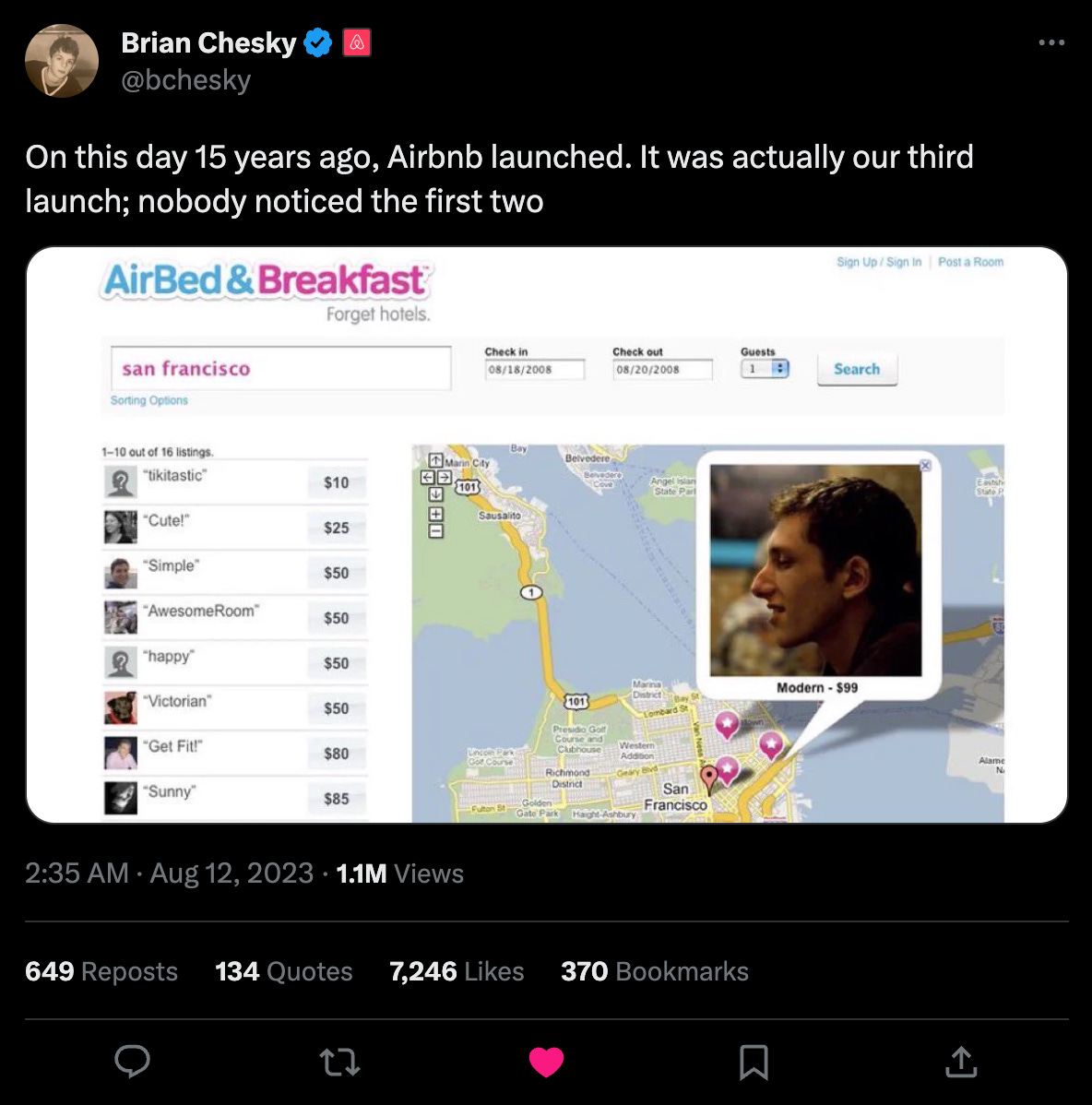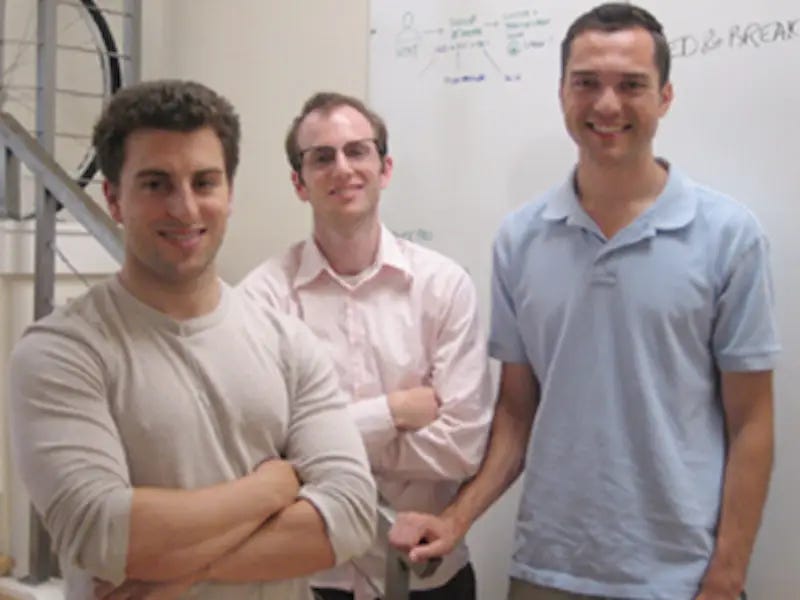⤴️ What's so special about Airbnb
Why Airbnb is one of the most successful startups of this age.
Hey! 👋
This is Exponential Founder. We share resources & information for aspiring founders, entrepreneurs, and startup enthusiasts.
In today’s post, you’ll find in-depth research about Airbnb.
“When you start a company, it's totally unknown. Instead of solving high-profile problems, try to solve something deeply personal to you. Ideally, if you're an ordinary person and you've just solved your problem, you might have solved the problem for millions of people.”
– Brian Chesky, Co-founder of Airbnb
What's so special about Airbnb
Recently, the Co-Founder of Airbnb, Brian Chesky, tweeted about their first launches in 2007 & 2008. I was intrigued to learn more about their history and success.
I started researching and understood that this needs to be an entire post.
So here it goes…
Airbnb’s numbers
Market Cap Valuation: 85.30B
Price of a share: 133.68USD
In 2023, there are a total of 6.6 million active Airbnb listings across the globe.
Airbnb is available in 190+ countries, which means nearly every country in the world has an Airbnb. (Source: Airbnb)
In 2008-2023, Airbnb rentals welcomed over 1.8 billion guest stays around the globe. (Source: Airbnb)
In 2023 Airbnb is employing around 10k people.
Airbnb has 2,5M followers on LinkedIn.
Impressive, right? But the start for the founders did not look that bright…
How it all started
In late 2007, Brian Chesky and Joe Gebbia moved from NY to San Francisco and had difficulty paying the rent.
They were looking for any way to earn extra cash.
They noticed that all hotel rooms in the city were booked, as the local Industrial Design conference attracted many visitors.
Because of that, Brian and Joe set up "Air Bed and Breakfast” (airbedandbreakfast.com), offering visitors a place to rest and breakfast in the morning on airbeds for $80 a night at their home.
The initial launch saw mixed results, with only two users, one of them being Chesky himself.
But soon, Gebbia and Chesky realized how big their idea could be. They partnered with their old roommate, Nathan Blecharczyk, to build it into a business.
By the summer of 2008, the founders had finished a final version of Air Bed and Breakfast and went to meet investors.
Investors weren't convinced. Introductions to 15 angel investors left them with eight rejections and seven people ignoring them entirely.
One investor they met in a cafe walked out in the middle of a meeting with them. They thought he was going to the bathroom but never returned. "He didn't even finish his smoothie," - Brian said.
The turning point came in 2008 at the Democratic National Convention in Denver, where hotel shortages prompted Airbnb's relaunch.
Since the site wasn’t making any money to fund themselves, they created and sold Obama O's and Cap'n McCains cereals, generating $30,000.
This caught the attention of Paul Graham and his famous accelerator Y Combinator, providing them with their first funding of $20,000.
This was the start of something big.
By 2011, four years after the first air mattress guests, Airbnb was already in 89 countries and had hit 1 million nights booked on the platform. It also won the break-out mobile app award at SXSW.
That same year, some of Silicon Valley's biggest VCs put $112 million into the startup, valuing it at over $1 billion. That made Airbnb a "Unicorn." 🦄
Why Airbnb is that successful
They saw the big picture:
“Why hadn't they given up? This is a useful question to ask. People, like matter, reveal their nature under extreme conditions. One thing that's clear is that they weren't doing this just for the money. As a money-making scheme, this was pretty lousy: a year's work and all they had to show for it was a binder full of maxed-out credit cards. So why were they still working on this startup? Because of the experience they'd had as the first hosts.
When they first tried renting out airbeds on their floor during a design convention, all they were hoping for was to make enough money to pay their rent that month.But something surprising happened: they enjoyed having those first three guests staying with them. And the guests enjoyed it too. Both they and the guests had done it because they were in a sense forced to, and yet they'd all had a great experience. Clearly there was something new here: for hosts, a new way to make money that had literally been right under their noses, and for guests, a new way to travel that was in many ways better than hotels.”
– Paul Graham, first investor in Airbnb.
They had a mission:
“They went there in person to visit their hosts and help them make their listings more attractive. A big part of that was better pictures. So Joe and Brian rented a professional camera and took pictures of the hosts' places themselves.
This didn't just make the listings better. It also taught them about their hosts. When they came back from their first trip to New York, I asked what they'd noticed about hosts that surprised them, and they said the biggest surprise was how many of the hosts were in the same position they'd been in: they needed this money to pay their rent. This was, remember, the worst recession in decades, and it had hit New York first. It definitely added to the Airbnbs' sense of mission to feel that people needed them.”– Paul Graham, first investor in Airbnb.
They focused on niche markets:
“Similar to how the founders first focused on New York early on, when Airbnb expanded internationally in 2011, we focused on creating critical mass in just a few markets in which we were quickly able to unlock supply and demand.”
— Kati Schmidt, early employee
They focused on building the community:
I think the key that makes Airbnb is the fact that we're a community, not just a series of commodities.
– Brian Chesky, Co-founder
Ultimately, the power of the Airbnb platform is that it motivates guests to blend into communities, belong anywhere, and live like locals.
– Joe Gebbia, Co-founder
They had a great business model:
One of the keys to Airbnb's success is its business model, which allows it to offer competitive prices while still generating a healthy profit. And let’s not forget that they help hosts to generate more money and people to travel and experience the culture easier.
Of course, that’s not it. There are many more details why Airbnb is successful that compounded over time.
Even though the covid times were tough for the whole company, Airbnb is rising again, and now they want to focus on the experiences even more!
Some other interesting facts about Airbnb:
It took Airbnb 12 years to go public. It was founded in 2008 and underwent an IPO in 2020
The top 5 most-searched-for amenities on the Airbnb platform are a pool, Wifi, a kitchen, free parking, and a jacuzzi.
Since 2008, global Airbnb hosts have earned over $180 billion in revenue on the platform.
In YC Accelerator, their Ramen Profitability was $4000 a month: $3500 for rent and $500 for food. They taped this goal to the mirror in the bathroom of their apartment.
Other interesting resources
🔥 Kilo Health is looking for 12 CEOs to join Health Tech startups.
💪 Bad Ideas Fund is launching a Fundraising School for Early-stage Founders. Apply by August 31st!
🤔 Is Starbucks secretly a bank? Tom shares the research he did.
Suggestions? Love? Critique?
👉 Here is a 1 min feedback form for you.







